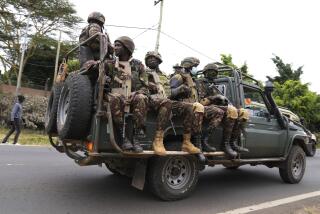Student March Stifled in Zaire; Ex-Premier, Cash Allegedly Missing
KINSHASA, Zaire — Opponents of President Mobutu Sese Seko paralyzed Zaire’s capital for a second day Tuesday, but troops blocked a potentially more disruptive student march.
On the diplomatic front, Laurent Kabila’s rebels, who now control a third of the large Central African nation, faced an increasing number of appeals from governments, including the United States, to return to the negotiating table.
In Kinshasa, the continuing crisis took a bizarre turn Tuesday when the embattled government accused former Prime Minister Leon Kengo wa Dondo of fleeing the country with part of the state treasury, including millions of dollars earmarked for use in fighting the rebel forces.
Information Minister Kin-Kiey Mulumba said the former prime minister has stolen millions of dollars; another Mobutu aide said the amount was at least $120 million.
Kengo has fled the country, and Zaire is seeking his arrest, officials said.
Supporters of Etienne Tshisekedi, who followed Kengo as prime minister but was ousted last week, have resorted to protests while Kabila’s rebels pursue an armed campaign from eastern Zaire.
Tshisekedi supporters shut down the teeming capital with a widely observed stay-at-home order Monday. Pro-Tshisekedi protest organizers asked students to skip school and college Tuesday and to turn out in vehicles.
Although students were unable to gather in large numbers or protest through the streets of Kinshasa, the opposition claimed victory.
“We have done what we wanted to do. People did not go to work. The people listened to us,” said opposition spokesman Laurent Mabyo.
But a government spokesman dismissed the claim, saying the authorities had shown that emergency rule clamped on the country by Mobutu last week was working.
“There was no march because students were afraid they would be arrested,” said Leon Kalima, spokesman for emergency-rule Prime Minister Gen. Likulia Bolongo.
South Africa’s deputy foreign minister told a parliamentary committee in Cape Town that Zaire could be on the brink of negotiations about a transition to democracy.
“What has happened in an interesting way in the last few days is that both parties have signaled their commitment to meet directly,” Aziz Pahad said.
More to Read
Sign up for Essential California
The most important California stories and recommendations in your inbox every morning.
You may occasionally receive promotional content from the Los Angeles Times.










